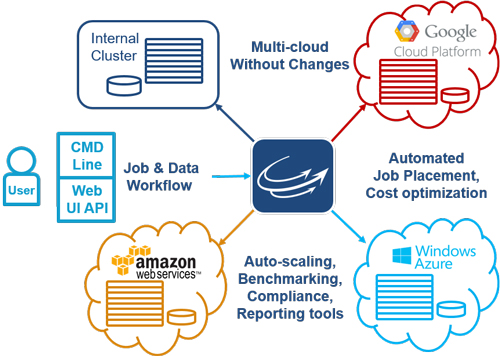News
With Acquisition, Microsoft Gains HPC Advantage over AWS, Google
Microsoft this week gained some leverage against its closest public cloud competitors in the high-performance computing (HPC) space.
Cycle Computing, a provider of large-workload management solutions for the cloud, is being acquired by Microsoft for an undisclosed amount, the two companies announced on Tuesday.
Founded in 2005, Cycle Computing develops orchestration software for deploying and managing virtual clusters and storage to enable HPC workloads, including machine learning, genomic research and complex simulations. The company's orchestration software, called CloudCycle, can run those workloads using any combination of the three largest public clouds: Amazon Web Services (AWS), Microsoft Azure and Google Cloud Platform (GCP).
Asked whether CloudCycle will continue to support AWS and GCP now that it's been acquired by Microsoft, a spokesperson said it will continue to support existing clients whose implementations include the two competitors. However, "future Microsoft versions released will be Azure-focused. We are committed to providing customers a seamless migration experience to Azure if and when they choose to migrate."
Interestingly, AWS showcased Cycle Computing at the 2013 AWS Summit event in New York. In an interview at that event, Stowe described an HPC project for a major pharmaceutical firm that used 10,600 server instances in AWS' Elastic Compute Cloud (EC2). To run that simulation in-house would require the equivalent of a 14,400 square-foot datacenter which, based on calculations from market researcher IDC, would cost $44 million, he said at the time.
"Essentially, we created an HPC cluster in two hours and ran 40 years of computing in approximately 11 hours," Stowe explained. "The total cost for the usage from Amazon was just $4,472."
During that interview, when asked if he was looking to other cloud services such as Azure, GCP or others, Stowe responded that only AWS was suited to such jobs. "Who knows what the future holds, but from our perspective, AWS has a tremendous advantage in its technology," he said at the time.
 Cycle Computing's CloudCycle HPC workflow and load balancing platform.
Cycle Computing's CloudCycle HPC workflow and load balancing platform.
On Tuesday, Microsoft Corporate Vice President Jason Zander said in the acquisition announcement that Azure is posed to benefit from Cycle Computing's tools, capabilities and experience in supporting some of the largest supercomputing. Zander also believes Cycle Computing will play a role in picking up the pace in mainstream cloud migration.
"Cycle Computing will help customers accelerate their movement to the cloud and make it easy to take advantage of the most performant and compliant infrastructure available in the public cloud today," according to Zander.
Cycle Computing says its software is used by companies of all sizes, including those -- like JPMorgan Chase, Lockheed Martin, Pfizer and Purdue University -- with some of the largest workloads. Its CloudCycle orchestration platform includes a workflow engine and load balancer that utilizes cloud resources to enable computation at any scale, while using encryption to ensure data remains secure.
The company is on pace to manage 1 billion core hours this year and is growing at a 2.7x annual pace, according to Cycle Computing CEO Jason Stowe in a separate announcement about the Microsoft acquisition.
Cycle Computing's customers spend $50 to $100 million on cloud services, according to Stowe, though he emphasized its software also supports on-premises and hybrid workloads. "Our products have helped customers fight cancer and other diseases, design faster rockets, build better hard drives, create better solar panels and manage risk for peoples' retirements," Stowe noted.
About the Author
Jeffrey Schwartz is editor of Redmond magazine and also covers cloud computing for Virtualization Review's Cloud Report. In addition, he writes the Channeling the Cloud column for Redmond Channel Partner. Follow him on Twitter @JeffreySchwartz.